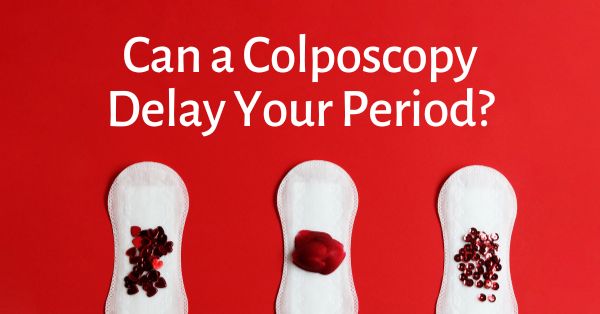With your gynecologist’s advice, you usually have a colposcopy yearly, and all has been well. You’ll admit how good it feels to know your cervix, vulva, or vagina are healthy. But, recently, your periods came late by three weeks – after the colposcopy- and it got you worried sick!
It got you wondering if the procedure affects your menstrual cycle. Can a colposcopy delay your period?
When should you expect your regular periods after a colposcopy?
Read on to discover.

Can a Colposcopy Delay Your Period?
Yes! Though in a few women, a colposcopy can change the timing of your monthly periods. This delay could be due to extreme stress/anxiety before the procedure. A National library of medicine Tombola study confirms a change in the length and timing of periods among women who have undergone colposcopy.
Further, the cervical biopsy – as part of colposcopy – can cause an imbalance in hormones that regulate the menstrual cycle, leading to delayed periods. This imbalance often happens due to light inflammation and bleeding in your cervix after the biopsy. If the delay persists, talk to your doctor to find out the leading cause of your delayed menses.
| Factor | Description |
|---|---|
| Stress from Colposcopy | Experiencing a colposcopy can be stressful for many, and this stress may lead to a delay in ovulation and menstruation. |
| Pain Medication | Medications taken to alleviate pain post-colposcopy can have an impact on the menstrual cycle, potentially causing a delay. |
| Anesthesia | Undergoing colposcopy with the use of anesthesia might influence the menstrual cycle and result in a delayed menstruation. |
Medication, Illness and Your Period
While a colposcopy may have an impact on your period, other factors such as medication and illness can also affect your menstrual cycle.
Certain medications, including hormonal contraceptives, can alter the length, frequency, and heaviness of your periods. For example, birth control pills work by manipulating your hormone levels to prevent ovulation, which can lead to lighter, less painful periods. On the other hand, some medications like antipsychotics and chemotherapy drugs can cause irregular periods or even stop them altogether.
Table of commonly used medicines that may delay your period
| Medicine | Mechanism of action | Potential for delaying period |
| Antidepressants | Alter hormone levels | High |
| Antipsychotics | Alter hormone levels | High |
| Blood thinners | Alter hormone levels | Medium |
| Corticosteroids | Increase stress levels | Medium |
| Beta-blockers | Increase stress levels | Medium |
| Anticonvulsants | Alter hormone levels | Medium |
| HIV medications | Alter hormone levels | Medium |
| Tuberculosis medications | Alter hormone levels | Medium |
| Anticancer medications | Damage ovaries | High |
| Immunosuppressants | Damage ovaries | High |
| HRT | Alter hormone levels | Low to medium |
| Contraceptive pills | Alter hormone levels | Low to medium |
| Emergency contraception | Alter hormone levels | High |
| Aspirin and other NSAIDs | Alter hormone levels | Low to medium |
| Stimulants | Increase stress levels | Medium |
| Antihistamines | Increase stress levels | Low to medium |
| Sleep medications | Increase stress levels | Low to medium |
| Motion sickness medications | Increase stress levels | Low to medium |
| Allergy medications | Increase stress levels | Low to medium |
| Digestive enzymes | Unknown | Low |
Illness can also have an impact on your menstrual cycle. Conditions that affect your reproductive organs, such as polycystic ovary syndrome (PCOS) and endometriosis, can cause heavy or irregular periods. Systemic illnesses, including thyroid disorders and diabetes, can also disrupt your menstrual cycle. Stress and significant changes in weight can also lead to irregular periods.
When To Expect My Normal Period After a Colposcopy
Depending on individual women, it may take two weeks –six months for your monthly cycle to normalize. While the answer to “can having a colposcopy delay your period is Yes, The recovering cervix also plays a part in your menstrual cycle. The cervix may take six months to heal fully and enhance ovulation.
Delayed Period After Colposcopy: Tips To Bounce Back
1. Be Patient, Time Will Fix It
It’s normal for women to experience a delayed period after colposcopy. The procedure can disrupt the hormonal balance in the body, leading to a slight delay in menstrual periods. In most cases, delayed periods will resolve themselves within a few cycles. However, if your period doesn’t resume after three to four months, it’s essential to seek medical attention.
2. Keep Track Of Your Menstrual Cycle
It’s important to track your menstrual cycle to determine any changes in your cycle after colposcopy. Keeping a record will help you identify any abnormalities and seek medical attention promptly. You can use a menstrual tracking app or a calendar to keep track of your periods and other symptoms.
3. Eat A Healthy Diet
A healthy diet full of fruits, vegetables, and lean protein helps regulate your hormones and menstrual cycle. Eating a balanced diet can also reduce the inflammation and stress in your body, which can affect your menstrual cycle. Also, avoid processed foods, caffeine, and alcohol, which can interfere with hormonal balance.
4. Get Regular Exercise
Exercise is an excellent way to regulate your hormones and improve your overall health. Regular physical activity can help reduce stress, which can affect your menstrual cycle, and promote healthy hormonal balance. It’s recommended to get at least 150 minutes of moderate aerobic exercise per week for optimal hormonal health.
5. Avoid Smoking
Smoking is known to disrupt hormonal balance and can lead to delayed periods after colposcopy. Nicotine can interfere with estrogen production and affect the menstrual cycle. Therefore, it’s essential to avoid smoking and tobacco products, which can harm your overall health and menstrual cycle.
Colposcopy: What is it, and why do I need it?
A colposcopy is a medical procedure done by a specialist nurse to look for abnormal cell growth or patterns in your vagina, vulva, or cervix. Your doctor uses a special, binocular-like microscope to examine and confirm abnormal Pap smear results.
A colposcopy diagnoses the following:
- Genital warts
- Inflammation of the cervix(Cervicitis)
- Precancerous tissues in the vagina, cervix, or vulva
Before the procedure, it’s perfectly normal to feel anxious, but don’t let the feeling overwhelm you. Colposcopy is generally safe and is performed like a short pelvic exam.
Not all colposcopies end up with a biopsy. If the colposcopist detects unusual cells, they may have to do a biopsy to get a piece of it necessary for further lab tests.
What To Expect After a Colposcopy
Like any other medical exam, you may have a dozen questions before and after a colposcopy exam. It’s okay to wonder, “Can a colposcopy affect your period?” During recovery, you may also be unsure about the dos and don’ts.
If you had a colposcopy only, it’s normal to experience pain-like discomfort with mild spotting/ vaginal bleeding.
In the event you had a biopsy after the procedure, here’s what to expect:
Immediate Post-Procedure Effects:
- Slight discomfort or cramps in the abdominal region
- Minimal bleeding or spotting
- A vaginal discharge that may appear brown or contain traces of blood
- Possible spotting or bleeding following urination or defecation
- A heavier first menstrual period due to dilation of the cervix
Effects Within Several Days Post-Procedure
- Enhanced vaginal discharge which might appear thicker and more liquid-like
- Gentle pain or sensitivity around the cervix
- A feeling of irritation or a burning sensation inside the vagina
- Elevated susceptibility to infections
Effects Roughly a Week Post-Procedure
- By this time, any side effects experienced should typically have subsided.
Is a Colposcopy Risky?
Though rare, a colposcopy might come with risks such as:
- Heavy vaginal bleeding- any vaginal bleeding that soaks your pad within 2 hours is dangerous.
- Excess pelvic pain- If you feel pain in your pelvis that lasts for more than two weeks, it’s a cause for alarm.
- Infections- A pain in your cervix or vagina that doesn’t go away after taking pain medication, foul-smelling discharge lasting for over seven days, and high fever point to a severe infection.
If you notice any of the above symptoms, call your doctor immediately.
Tips for Speedy Recovery after a Colposcopy
1. Engage in vaginal intercourse 24 hours after the procedure, as it may cause infection.
2. Don’t use tampons before two days elapse.
3. If you have any vaginal medications, avoid using them until vaginal pain subsides.
4. Postpone doing heavy exercises, including weight-lifting and swimming, to a later time.
5. Ask your doctor for the most suitable medicines to ease pain/discomfort.
6. As you await results, ask friends and relatives for emotional support. The wait may take up to six weeks.
The support system helps keep stress/ anxiety at bay. According to Healthline, stress affects the hypothalamus, the part of your brain responsible for regulating monthly periods.
7. Don’t worry too much about your distorted menstrual cycle, as it may further delay ovulation.

Wrapping Up
Can a colposcopy delay your period? While every woman is unique, some women have reported incidences of delayed menstrual periods after undergoing a colposcopy. This could be due to anxiety or disruption of hormones after a colposcopy cervical biopsy.
That said, it’s perfectly normal to experience a change in the timing of your cycle, but don’t overlook other dangerous post-complications such as infections, bleeding, and period-like abdominal cramps.
Talk to your doctor about the waiting time for results and practice relaxation techniques during this period. Call your doctor for professional advice if you’re concerned about anything after the colposcopy.
More to Read: